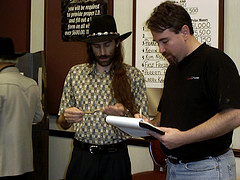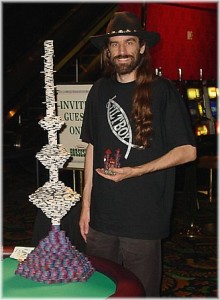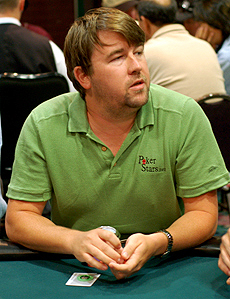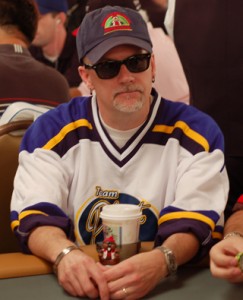
There is really no need to interview Perry as the spewage is constant. If I took notes in shorthand on speed, it would be hard to keep up with the banter
— Amy Calistri
I wrote that about Perry Friedman in April 2003 – later quoted in Tales from the Tiltboys. I had played online with Perry before, but it was the first time we physically met. I recognized him immediately from across the decrepit bleachers, temporarily erected in Benny’s Bullpen. His notorious fidgeting betrayed his identity. We were among the fewer than 30 people gathered to watch Chris Ferguson win a World Series of Poker bracelet in Omaha hi/lo.
 I moved next to Perry to try to engage him. It was like tapping into a fire hose. In the hours that passed, he orchestrated dozens of outlandish prop bets — but mostly he gushed about his latest business venture. He and a number of other pros were going to launch a new online poker site.
I moved next to Perry to try to engage him. It was like tapping into a fire hose. In the hours that passed, he orchestrated dozens of outlandish prop bets — but mostly he gushed about his latest business venture. He and a number of other pros were going to launch a new online poker site.
I tried not to be rude, but IMHO the time had passed for online poker entrants. Planet Poker, Paradise Poker, PartyPoker and PokerStars all had healthy head starts in the US online poker market. The upfront software development costs would be huge. It would be a battle, trying to unseat entrenched market leaders with years under their belts. The more Perry babbled on, the more worried I became for his misguided online poker vision.
 By 2003, Benny’s daughter Becky had run Binion’s into the ground. A few months after the 2003 WSOP, Becky stopped paying into the employees’ pension and medical plans. In January 2004, federal marshals seized the money owed the employees and effectively shut Binion’s doors.
By 2003, Benny’s daughter Becky had run Binion’s into the ground. A few months after the 2003 WSOP, Becky stopped paying into the employees’ pension and medical plans. In January 2004, federal marshals seized the money owed the employees and effectively shut Binion’s doors.
In that respect, the low-ceilinged tournament room at Binion’s seemed an unlikely setting for a catalyst that would bring on the dawn of the poker boom. Just a few weeks after Perry and I whiled away the hours on the bleachers, an unknown player won the WSOP Main Event — after winning his $10,000 entry fee by playing a low dollar online poker satellite.
 A few days before I met Perry, I had been at the taping of the first World Poker Tour Championship at the Bellagio with Lou Krieger. The first televised season of the WPT and Chris Moneymaker’s WSOP win gave birth to more million-dollar Cinderella dreams than any ad campaign could ever produce.
A few days before I met Perry, I had been at the taping of the first World Poker Tour Championship at the Bellagio with Lou Krieger. The first televised season of the WPT and Chris Moneymaker’s WSOP win gave birth to more million-dollar Cinderella dreams than any ad campaign could ever produce.
The subsequent growth in online poker was exponential. It’s estimated that $60 billion was wagered in online poker in 2005 alone. The WSOP was also a beneficiary, fueled by the vast numbers of online qualifiers. The year Chris Moneymaker won the WSOP Championship, 839 players entered the event. A year later, 2,576 entered the $10,000 buy-in tournament. In 2005, there were over 5,600 entrants.
Full Tilt Poker launched in June 2004. The player-centric, celebrity/pro marketed, site quickly unseated most of its competition. Its performance eventually exceeded even Perry’s unbridled optimism.
 For me, the poker boom was always a double-edged sword. My first poker article was published in the July 2004 issue of Canadian Poker Player magazine, reposted here. The boom allowed me to make a living, writing about the game I had come to love. Of course none of that would have happened without the support of Lou Krieger (who encouraged me to write), Dave Scharf (the first editor to publish me and who made me a better writer) and Andy Glazer (who believed poker — and its writers — should be judged by a higher standard).
For me, the poker boom was always a double-edged sword. My first poker article was published in the July 2004 issue of Canadian Poker Player magazine, reposted here. The boom allowed me to make a living, writing about the game I had come to love. Of course none of that would have happened without the support of Lou Krieger (who encouraged me to write), Dave Scharf (the first editor to publish me and who made me a better writer) and Andy Glazer (who believed poker — and its writers — should be judged by a higher standard).
But the boom also robbed me of my intimate relationship with poker. Before the boom, the WSOP was as much a family reunion as it was a sporting event. Just two years later it had become a place to see and be seen.
In 2003, I sat on the Starbucks patio outside Golden Nugget and could name 80% of the players who walked into Binion’s. In the years that followed, I was lucky to know 30% of the starting field of a high buy-in event or 1% of the field in a low buy-in event.
In poker’s heyday, I began to be nostalgic for its pre-dawn era.
But don’t it always seem to go….
Photos: Perry Friedman (2006), Chris Ferguson and Andy Glazer, Ferguson’s winning chip castle from BARGE 2003, Chirs Moneymaker (2006) and Dave Scharf (2006).
3 Comments